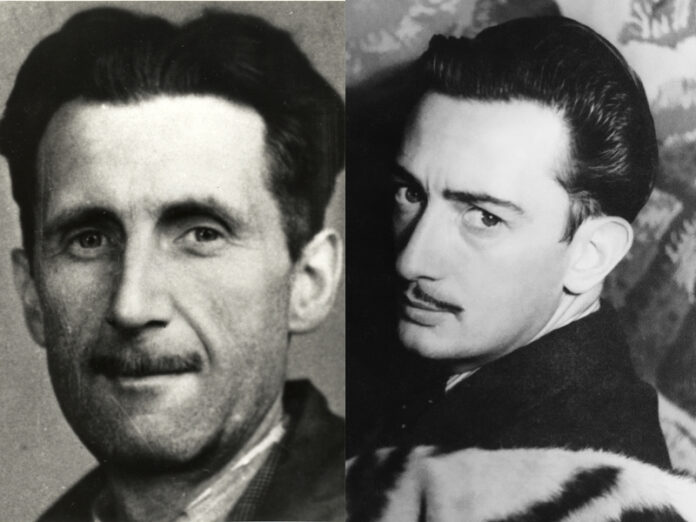Pictures or Orwell and Dali by means of Wikimedia Commons
Must we dangle artists to the similar standards of human decency that we predict of each and everyone else? Must talented people be exempt from ordinary ethicality? Must artists of questionin a position character have their paintings consigned to the trash in conjunction with their in step withsonal reputations? Those questions, for all their timeliness within the provide, gave the impression no much less thorny and compelling 81 years in the past when George Orwell conentranceed the abnormal case of Salvador Dali, an undeniably furtherordinary talent, and—Orwell writes in his 1944 essay “Benefit of Clergy”—a “disgusting human being.”
The judgment would possibly appear overly harsh excluding that any honest in step withson would say the similar given the episodes Dali describes in his autobiography, which Orwell reveals utterly rebellioning. “If it had been possible for a ebook to present a physical stink off its pages,” he writes, “this one would.” The episodes he refers to incorporate, at six years outdated, Dali kicking his three-year-old sister within the head, “as despite the fact that it have been a ball,” the artist writes, then running away “with a ‘delirious pleasure’ prompted through this savage act.” They come with throwing a boy from a suspension bridge, and, at 29 years outdated, trampling a tender woman “till they needed to tear her, bleeding, out of my achieve.” And plenty of extra such violent and disturbing descriptions.
Dali’s litany of cruelty to people and animals constitutes what we predict within the early lifetime of serial killers reasonably than well-known artists. Certainly he’s hanging his learners on, wildly exaggerating for the sake of concern value, just like the Marquis de Sade’s autobiographical fantasies. Orwell lets in as a lot. But which of the stories are true, he writes, “and which can be imaginary onerously matters: the purpose is that that is the type of factor that Dali would have appreciated to do.” Extraover, Orwell is as repulsed through Dali’s paintings as he’s through the artist’s character, knowledgeable as it’s through misogybig apple, a confessed necrophilia and an obsession with excrement and decayting corpses.
However in contrast needs to be set the truth that Dali is a draughtsguy of very exceptional items. He’s additionally, to pass judgement on through the minuteness and the certainness of his drawings, an excessively onerous paintingser. He’s an exhibitionist and a careerist, however he isn’t a fraud. He has fifty occasions extra talent than lots of the people who would denounce his morals and jeer at his paintings. And those two units of info, taken together, elevate a question which for loss of any foundation of agreement seldom will get an actual discussion.
Orwell is unwilling to dispass over the value of Dali’s artwork, and distances himself from those that would accomplish that on ethicalistic grounds. “Such people,” he writes, are “not able to confess that what is ethically degraded can also be aesthetically proper,” a “dangerous” position undertakeed now not simplest through conservatives and religious zealots however through fascists and writeritarians who burn books and lead campaigns in opposition to “degenerate” artwork. “Their impulse isn’t just to overwhelm each and every new talent as apparently, however to castrate the previous as neatly.” (“Witness,” he notes, the outcry in America “in opposition to Joyce, Proust and Lawrence.”) “In an age like our personal,” writes Orwell, in a particularly jarring sentence, “when the artist is an exceptional in step withson, he should be allowed a certain quantity of irresponsibility, simply as a pregnant girl is.”
At the exact same time, Orwell argues, to forget about or excuse Dali’s amorality is itself grossly irresponsible and generally inexcusin a position. Orwell’s is an “belowstandin a position” reaction, writes Jonathan Jones at The Guardian, given that he had fought fascism in Spain and had observed the horror of struggle, and that Dali, in 1944, “used to be already flirting with pro-Franco perspectives.” However to fully illustrate his level, Orwell imagines a scenario with a miles much less controversial figure than Dali: “If Shakespeare returned to the earth to-morrow, and if it had been discovered that his favorite recreation used to be raping little ladies in railapproach automobileriages, we must now not inform him to move forward with it at the flooring that he would possibly write another King Lear.”
Draw your individual parallels to extra contemporary figures whose criminal, predatory, or violently abusive acts had been unnoticed for many years for the sake in their artwork, or whose paintings has been tossed out with the toxic tubwater in their behavior. Orwell seeks what he calls a “middle position” between ethical condemnation and aesthetic license—a “fascinating and laudin a position” critical threading of the needle, Jones writes, that avoids the extremes of “conservative philistines who condemn the avant garde, and its professionalmoters who indulge each and everyfactor that someone like Dali does and refuse to look it in an ethical or political contextual content.”
This ethical critique, writes Charlie Finch at Artnet, assaults the assumption within the artwork international that an appreciation of artists with Dali’s peculiar tastes “is automatically enlightened, professionalgressive.” Such an attitude extends from the artists themselves to the society that nurtures them, and that “lets in us to welcome diamond-mine personalers who fund biennales, Gazprom billionaires who purchase diamond skulls, and real-estate moguls who dominate temples of modernism.” Once more, you might draw your individual comparisons.
Word: An earlier version of this put up seemed on our web site in 2018.
Related Content:
When The Surrealists Expelled Salvador Dalí for “the Glorification of Hitlerian Fascism” (1934)
George Orwell Critiques Mein Kampf: “He Envisages a Horrible Mindmuch less Empire” (1940)
How the Nazis Waged Warfare on Modern Artwork: Within the “Degenerate Artwork” Exhibition of 1937
Tolstoy Calls Shakespeare an “Insignificant, Inartistic Author”; 40 Years Later, George Orwell Weighs in at the Debate
Josh Jones is a creator and musician primarily based in Durham, NC. Follow him at @jdmagness









